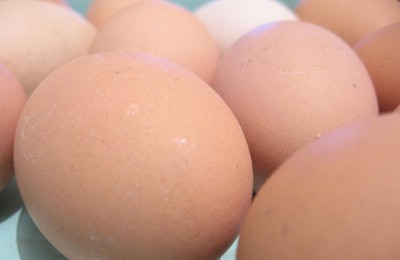
Hillandale Farms has concerns that it a bill that would outlaw the production and sale of cage-raised eggs in Maine does not have realistic timelines.
Under consideration in the state is a bill that would make require that only cage-free eggs can be produced or sold in Maine after December 31, 2024.
A public hearing was recently held on the bill, LD 2084. Stephen Vendemia, president of Hillandale Farms Conn. LLC, provided written testimony concerning the proposed legislation.
He said the company is “agreeable to the bill,” provided it is amended. He said Hillandale is transitioning to cage-free egg production, but the timelines as established in the bill are not attainable.
“All future expansion at any of our facilities will only be with chickens in a cage-free environment. As our existing facilities age, they will only be replaced with cage-free locations. Hillandale Farms currently has at least three ongoing projects into further cage-free production. These projects started in early 2016 and will continue for the foreseeable future,” Vendemia wrote.
Hillandale is first working to meet consumer demands in Massachusetts, which according to a law there, only cage-free eggs can be sold in the state by January 1, 2022. He said the company’s farm in Connecticut will be done “as fast as our resources and construction permit – and there are definite limits.”
Vendemia said the company looks forward to serving Maine with cage-free eggs if the bill is passed, but expressed reservations about having the Turner facility available to provide the state with cage-free eggs.
“There is absolutely no way that we can commit to serving Maine with cage-free eggs from the Turner farm by (December 31, 2024), or by any specific date thereafter. There are just too many variables in the commitments which will have to be in place to guarantee supplying Maine out of Turner. Along with our commitment to cage-free, our company has an unyielding commitment to honesty and integrity – a commitment to our employees as well to the health and well-being of our chickens,” Vendemia wrote.
Legislators opposed to the bill
Maine State Rep. Joshua Morris testified against the bill, saying it unfairly targets Hillandale Farms. Hillandale’s operations in Turner are part of Morris’ district.
“This bill is designed to target the Hillandale Egg Farm that is in Turner, Maine. This farm employs over 100 local people and pays $400,000 in property taxes, as well as $30,000 in personal property taxes,” Morris testified.
“These jobs would be lost if this bill passes. The revenue would have to be made up by other residents or would result in cuts to services such as our volunteer fire departments in both towns, or our schools.”
Morris also pointed out that other farmers rely on manure from the Hillandale hens for fertilizer use. Without that recourse, they would need to purchase more expensive fertilizer.
He also pointed out that eggs from caged hens are less expensive to produce and therefore are less expensive for consumers.
“This bill is not good for Maine families,” Morris said. “We hear much of food insecurity in Maine. Eggs from caged hens are cheaper to produce. You can buy them for as little as 99 cents a dozen. Cage-free eggs can cost more than $5. This bill will drive up the cost of eggs in Maine.”
Senate Assistant Republican Leader Jeffrey Timberlake, a former worker at DeCoster Egg Farm, also expressed concerns about how the bill appears to target Hillandale, and how its timeline is unfair.
“In a conference call yesterday, I learned that the very earliest they could convert Turner into a cage-free facility is 10 years. If you pass this bill, you are signing a death certificate for this farm and all other surrounding farms,” Timberlake testified.
“I find it asinine that the amendment proposes Hillandale can sell its eggs to anyone but Mainers. This continues the same practices the bill is aimed against and only punishes Maine people from being able to buy them.”
Others to testify
In addition to a variety of citizens, several non-governmental organizations provided testimony. Testifying against the bill were the Maine Farm Bureau Association and the National Association of Egg Farmers.
Testifying in favor of the bill were the New England Brown Egg Council, Mercy for Animals, Maine Animal Coalition, Animal Wellness Action, Humane Society of the United States (HSUS), World Animal Protection and the American Society for the Prevention of Cruelty to Animals.
HSUS has a history of being adversarial to Hillandale’s operations. In 2016, HSUS released a video that showed alleged animal mistreatment at a Hillandale facility. Then Gov. Paul LePage dismissed the allegations against Hillandale, saying it was an undercover HSUS member that was mistreating hens, not Hillandale.
“(Hillandale) hired a gentleman to come in (and) take care of the chickens. So what did he do? He brought his camera and he was watching chickens doing things where they were being hurt. And he never lifted a finger. In fact, he was cruel to animals,” LePage said.
















